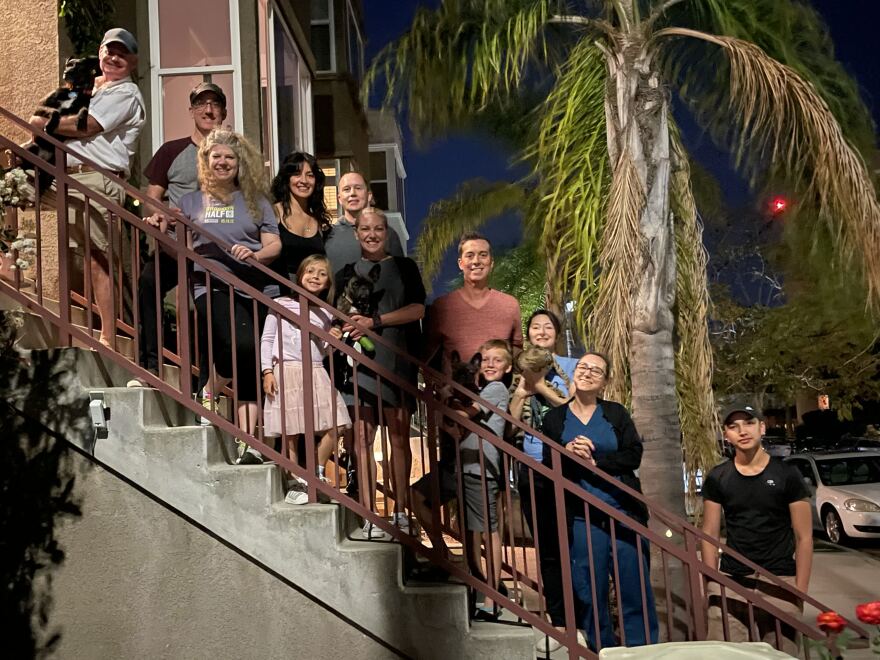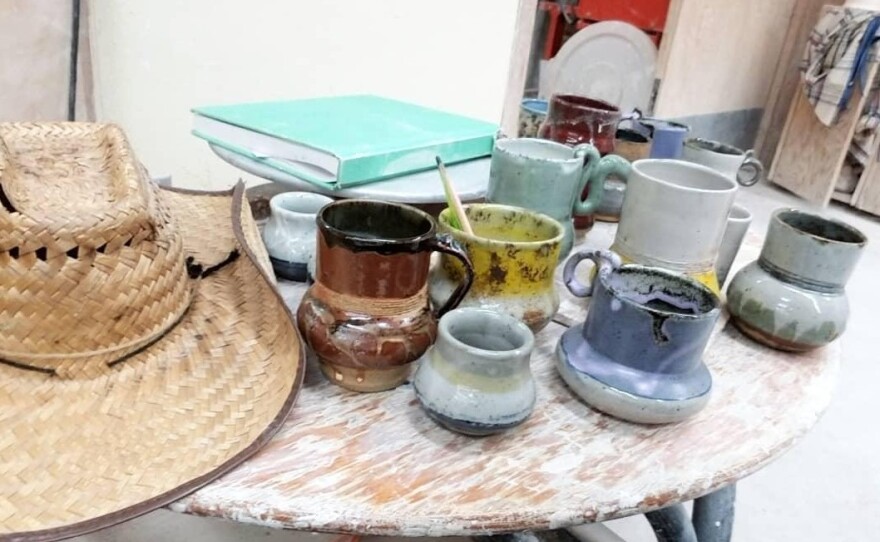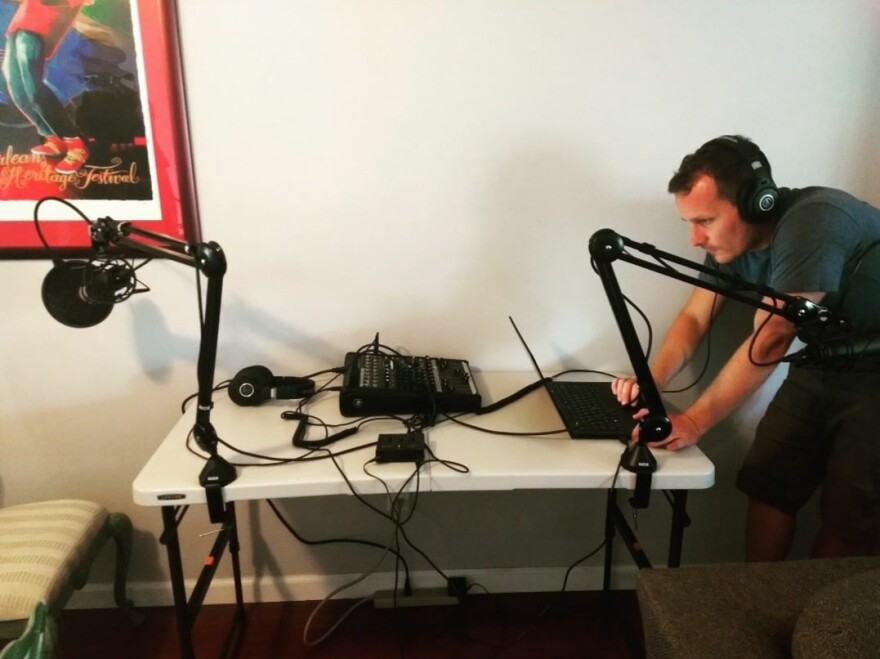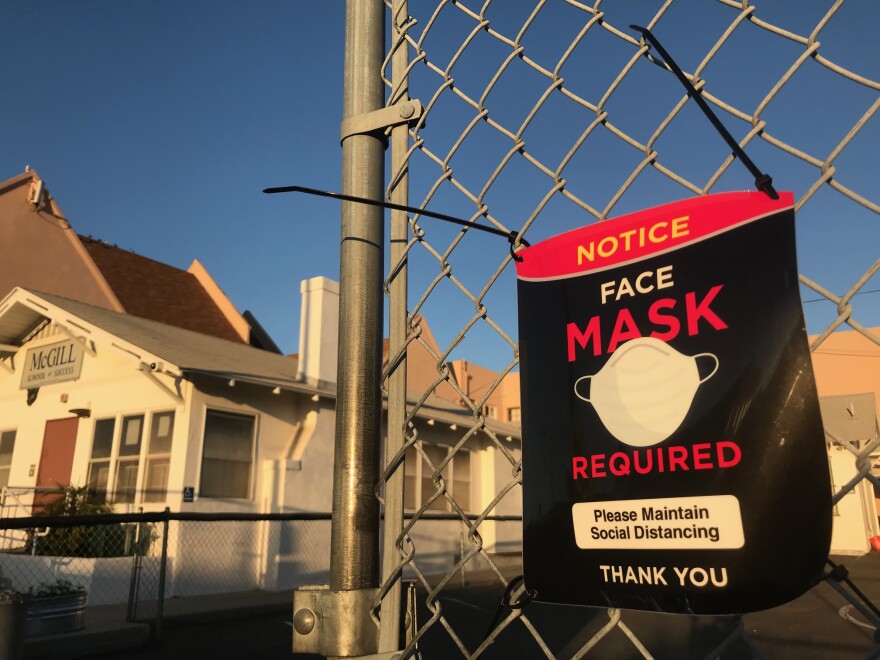In March of 2020, San Diego was in the early days of an unprecedented shutdown. Governor Gavin Newsom told everyone in California to shelter in place with few exceptions as the COVID-19 pandemic took hold.
Since then, many peoples' lives have changed dramatically. Families lost loved ones. Millions lost jobs. Some lost their place to live. Essential workers, from hospitals to grocery stores became the lifeblood of the community. Businesses shuttered, classrooms became computer screens, and bedrooms and kitchens became offices.
RELATED: California Governor Orders Statewide Stay-At-Home Order
Now as some San Diegans take off their masks and return to a life that looks more like it did before the pandemic, we each have our own pandemic story. KPBS Midday Edition spoke to four San Diegans about how their lives have changed during the pandemic. Here are their stories.
For Marcie Colleen, a Bankers Hill resident, what began as a way to thank doctors and nurses, ended up helping her form lasting bonds with her neighbors.
'It was a really special time to be able to have people close to you when you know, up until that point I didn't really feel like I belonged'Marcie Colleen
"At that time we could hear the cheering going on downtown and every night it felt like it got a little bit closer to Bankers Hill. And I could not wait until it finally made it up to Bankers Hill so that I could go out and cheer as well. And I think we waited until it got to about three or four blocks away and I couldn't contain it anymore and my husband and I went outside. We took a cowbell with us and we started cheering, and several of our neighbors came out too, with pots and pans and clapping, hooting and hollering. This went on every single night at 8:00 p.m. We even have some neighbors on our block who work at the hospital, and we would sometimes cheer them home as they would be pulling into their driveways.

"Every single month it seemed like we got a little bit closer. We would take a few steps closer to each other as we were cheering and one night we just chatted afterwards, introduced ourselves, of course standing six feet apart, and eventually we started texting each other, sharing phone numbers. And when most of the mandates were kind of lifted in June of 2021, we decided that we were going to finally stop cheering. We had been cheering every single night from April 2020 until June '21, and we decided that we were going to mark the occasion with going out to dinner together. And we all went out to dinner at Liberty Station and it was a great way to just kind of meet each other. And since then, we've celebrated every single person's birthday in the driveway. We've had pumpkin carving parties on Halloween. We've toasted midnight on New Year's Eve, and every single day now when I go out for my morning run, I'm waving, I'm stopping, I'm talking to my neighbors because we actually came together during the pandemic and it's a really good feeling.
"In February 2021, I did lose my dad to COVID, and just having my neighbors around me— I don't know many people in San Diego — and just having that feeling of belonging somewhere and still going out and cheering every single night, I felt like I was not only doing that for the essential workers and everybody we've lost, but now my dad was included in that, and it was a really special time to be able to have people close to you when you know, up until that point, I didn't really feel like I belonged."
-Marcie Colleen, Bankers Hill
Not all essential workers were being cheered and celebrated. In the early days of the pandemic, San Diegan Tiffany Castro-Tremblay worked in a grocery store, and she describes how her experience being on the receiving end of the public’s panic and anger took a toll.
'I've seen people get vicious over not having the right creamer, or having to wait an extra minute in line when we were very short staffed'Tiffany Castro-Tremblay
"I remember the first day that school was canceled, things were shut down and people were panic buying. I remember the lines were all the way to the back of the store and the attitudes of the store that day were pretty grim. It's actually kind of mind blowing to think about how much has happened in the last two years, but I remember everything from the George Floyd protests and how we had to be rushed out of the store for that. But in general, looking back, I think I just remembered how fearful everyone was.

"I would have to say over these last two years, I feel pretty like war torn, and so I think for me, these last two years have taught me how to be prepared when someone in front of you becomes unhinged for whatever reason. I've seen people get vicious over not having the right creamer, or having to wait an extra minute in line when we were very short staffed.
"During the pandemic, there were a lot of changes besides what was happening. The plan was always for me to go back to grad school to train to become a marriage and family therapist. And so I started grad school right in the middle of 2020. And unfortunately, my mother also passed around that same time. So it was quite an uphill battle, not only being immersed in the world of COVID and working retail, but also grieving and diving back in to school.
"I think learning and training to be in the mental health field while COVID was happening was such a strange and unique experience. Because on one hand, I'm training on how to care for people who just have really rough circumstances in their life that they want to navigate through or who are recovering from trauma and in my other job I am face-to-face with people who are experiencing trauma or who are handing out trauma to other people, unfortunately, while they're shopping for their groceries. When I say that I mean, like fights in the store, like physical fights in the store over someone wearing a mask or not wearing a mask, verbal abuse from customers directed at us workers or even just the person behind them. I think for me it accumulated, it was just too much to handle. It got exhausting. So I realized I had to get out of retail, and I decided to work with kids, and I haven't looked back."
-Tiffany Castro-Tremblay, marriage and family therapist, San Diego
Students from kindergarten through college struggled with the transition to virtual classrooms. Christian Limon, a former San Diego State University Art student was used to working with his hands. And at first, the computer screen was an unwelcome barrier.
'We ended up forming this different kind of bond, virtually'Christian Limon
"As a San Diego State ceramics student, it was difficult to transition from going every day to do what I love in the studio, to not having access to the studio after the pandemic hit. For us, we transitioned from playing and working with actual clay, to practically not working with any clay or any materials because we couldn't finish the work. And the whole point of the program was to help you turn a ball of clay into a piece of art. So for us, most of the time we simply discussed ceramics theory, art theory.

"At first I was angry, but then I was relieved because we had Mary Cale, who was our professor there at San Diego State. And while she wasn't able to provide us with the resources we needed to continue our work at home, she was at least that shoulder we could lean on. And most days, when we would tune into the Zoom call for ceramics, we would just talk. We would just check on each other and we would make sure that we were at least getting our feelings out and hearing each other out, because for a lot of us, the pandemic caused us to not be able to do what we love. We love being in the ceramic studio, we love talking to each other and working with each other, and we couldn't do that anymore. So what ended up happening was, we ended up forming this different kind of bond, virtually."
-Christian Limon
From the challenges of working from home, to losing a job, San Diegan Scott Borgen said the early days of the pandemic were very stressful. But once he and his wife were back on track, they found a way to support local businesses while sharing their passion for craft beer and wine.
'It really helped bring positive light to a dire situation for both ourselves and the local craft culture in San Diego'Scott Borgen
"Around mid March, my job had told me that I needed to work from home, and it's funny I still have the email. It said 'we should all be back in the office in about two weeks, so expect to be back in the office by the end of March,' and here we are two years later and now I'm permanently working from home. Some people may have found that to be a blessing in disguise. But I've always been a proponent of liking to separate work and home. And so working from home was kind of difficult for me. Just being the fact that the walls start closing in on you. You get cabin fever.
"In addition to that, my wife lost her job right away when the pandemic hit. So immediately, as much as we were blessed to not be sick or know anyone who was sick, we had that stress of her losing her job right away. We were only a year into our first mortgage. So we were first-time condo owners and only a year in here she is having to find a new job already so that was stressful. But then when she found her new job, she had to work weekends, which was something that was added stress.
"After about a year and a half of living through our different schedules and everything else that went along with being kind of locked down, she was able to find a different job and got back to that Monday through Friday work life. That really helped with balancing out us being able to work around the same time.

"Now that we have weekends back together, what can we do to leverage this benefit to make something positive out of this whole situation? So we really want to support our local businesses in San Diego. We really have a passion for craft beer and craft wine, and so it was pretty obvious what we needed to do, which was like, let's just make a hobby out of [it]. And I knew how to do a little bit of podcasting in terms of writing it, but I really had to teach myself the audio editing and all that behind the scenes that went with it. The podcast is called 'Frequent Flighters.' It really helped bring positive light to a dire situation for both ourselves and the local craft culture in San Diego."
-Scott Borgen






